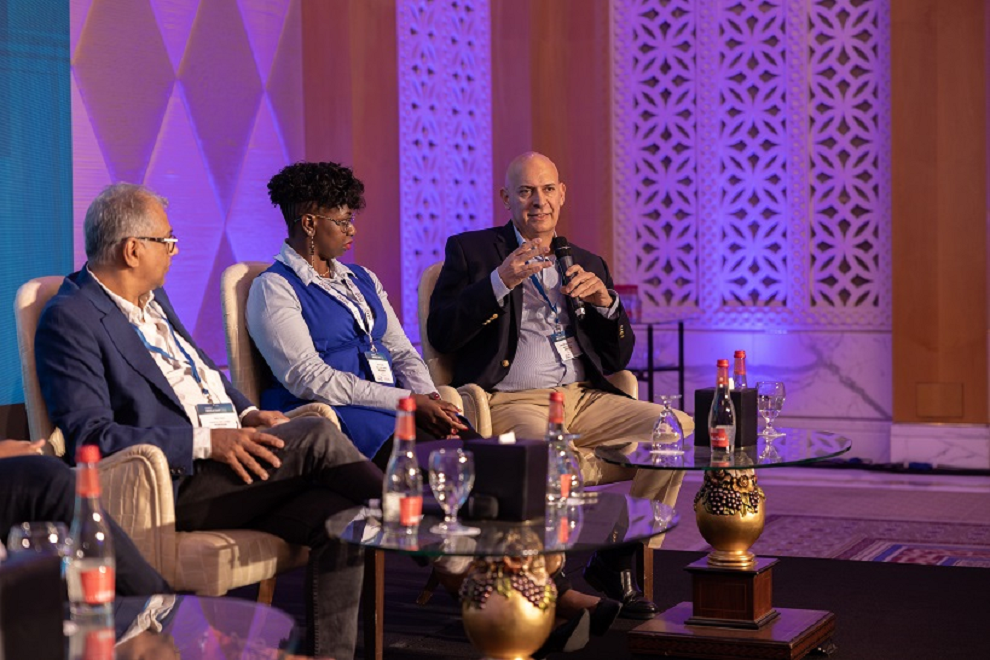Diverse panels, industry leaders, and strategic discussions drive collaboration and innovation in Dubai
Capacity Middle East 2024, set to unfold on February 6th at the Grand Hyatt Conference & Exhibition Centre in Dubai, is poised to be a landmark event in the telecommunications and technology sectors. The conference is anticipated to attract over 2600 attendees, with 55% of them occupying senior-level positions, creating an environment conducive to meaningful networking, collaboration, and knowledge exchange within the industry.
The event aims to foster collaboration, explore transformative technologies, and address the evolving needs of the telecommunications sector. With an impressive lineup of over 50 expert speakers, Capacity Middle East promises deep dives into critical issues, practical insights, and strategic discussions that will shape the industry’s trajectory.
The opening session on Day 1 is strategically designed to set the tone for the entire event. It will explore the strategic advantages of the Gulf Cooperation Council (GCC) region as a global connectivity hub. This chat show is divided into four segments, covering topics such as digital goals in a digital age, the softwarized evolution, the digital infra roadmap, and visionary aspirations for digital transformation. The emphasis is on collaborative efforts and the promotion of global connectivity.
Panel discussions scheduled for the event address crucial industry challenges. These include restoring trust in messaging and voice services, the impact of Generative AI on the tech industry, and tackling artificial inflation of traffic (AIT) in SMS services. Industry leaders and experts will share valuable insights and expertise, providing attendees with perspectives on emerging trends, technological advancements, and strategic insights crucial for the industry’s future.
A spotlight session will turn the focus to Iraq’s increasing influence in the Middle Eastern connectivity landscape. It will delve into the geographical significance of Iraq, its potential as the shortest path to Europe, and the broader impact of Iraq becoming a new hub. The session aims to cover aspects like lower latency, cost efficiency, and investment opportunities.
Another crucial panel will discuss investments in digital infrastructure, offering attendees insights into the current landscape of digital infrastructure in the Middle East and North Africa (MENA) region. It will explore ongoing mergers and acquisitions (M&A) activities, consortium formations, and emerging business models, giving participants a nuanced understanding of the dynamic market.
The Middle East Network Operators Group and Peering Forum will prompt attendees to reflect on the future-readiness of their networks, addressing scalability, resilience, cybersecurity preparedness, and the ability to navigate evolving internet regulations. Insights from member surveys conducted by the Regional Internet Registry for Europe, Middle East, and Central Asia (RIPE NCC) and the Middle East IXP report will add a practical dimension to the discussion.
Sessions also include discussions on providing an interconnectivity framework to the Gulf Cooperation Council (GCC), the role of peering in driving the Middle East’s digital economy, commercializing the next mobile money platform, and the pressing need for ultra-low latency in the region’s gaming and publishing market.
On Day 2, one of the key sessions is a keynote panel focusing on the transformative impact of route diversity on the Middle East’s subsea cable map. The discussion will delve into the reasons behind current shifts in route diversity, identifying countries emerging as key actors in this evolving landscape. Additionally, insights will be provided into the strategic motivations and geopolitical considerations driving these changes.
A significant aspect to be covered is the impact of new subsea cable projects, particularly those along the Red Sea coast via the Levant region, on altering the Middle East’s traditional role as a digital hub connecting the East and West. Attendees can expect to gain an understanding of the implications for increased bandwidth and global digital traffic routing.
A key focus of this discussion will be on Egypt’s role in readdressing the balance of the Middle East’s digital connectivity. This may touch upon Egypt’s strategic positioning, infrastructure developments, and the country’s influence on the evolving subsea cable map. The panel will likely highlight how the influx of subsea cables is unlocking the potential of quick and developing ICT markets in the Middle East, providing insights into the economic and technological opportunities arising from increased bandwidth and enhanced connectivity.
Moving on to another panel session, the focus is on how Network as a Service (NaaS) is reshaping the networking landscape. The panel will delve into emerging network technologies and evolving trends driving the transformation of traditional networking landscapes. Attendees can anticipate insights into the latest innovations shaping the NaaS landscape.
The session will also provide guidance on how organizations can effectively onboard NaaS, Infrastructure as a Service (IaaS), and other “as-a-service” models. Attendees will gain insights into the considerations, challenges, and best practices for adopting these transformative service delivery approaches.
A key focus of the discussion will be helping participants understand the right direction to take when embracing NaaS and related service models. The panel will likely provide practical advice on aligning organizational goals with the most suitable “as-a-service” solutions. The overarching theme is to equip participants with a comprehensive understanding of the rapidly evolving networking landscape, including navigating new technologies, understanding market trends, and making informed decisions to leverage NaaS effectively.
A discussion will revolve around the critical intersection between connectivity and cloud networks, emphasizing the significance of partnerships between infrastructure providers and cloud companies. The panel will delve into how network providers can position themselves as viable alternatives to traditional cloud platforms. Participants can expect insights into building an infrastructure strategy that collaborates with hyperscalers while offering distinct advantages.
Adding value to customers through collaboration with cloud providers will be a key focus, exploring ways in which telcos can enhance customer experiences and provide unique offerings, ultimately benefitting from synergistic partnerships. The session will examine both the opportunities and constraints associated with partnerships between infrastructure providers and cloud companies. Participants can gain insights into navigating challenges while maximizing the benefits of collaboration.
The discussion will also touch upon whether carriers, facing increasing costs of capital, can afford to take the risk of moving further up the stack from their core capability set. Attendees can expect insights into strategic considerations and potential benefits for carriers in expanding their role in the cloud ecosystem. The overarching theme is capturing value at the cloud and network edge, highlighting the importance of collaboration and strategic alignment between connectivity and cloud networks.
Moving on, a panel discussion will focus on how growing international interest, particularly from Over-The-Top (OTT) providers and hyperscalers, has contributed to the growth of the Middle East. The panel will explore the pivotal role of the internet in driving growth and development in the Middle East.
A central theme will be the efficient penetration of international OTTs and hyperscalers into the Middle East. The discussion will delve into strategies, challenges, and best practices for these global entities to establish a robust presence in the region’s dynamic market.
The session will highlight how the increasing interest from OTTs and hyperscalers has positively impacted the capacity and quality of connectivity in the Middle East. Participants can gain insights into the technological advancements and infrastructure developments catalyzed by this heightened interest.
The discussion will address the region’s response to elevated demand for content and advanced technology use cases. Attendees can expect insights into how the Middle East has adapted its infrastructure and connectivity offerings to meet the evolving needs of a digital-savvy audience. The panel aims to provide a comprehensive understanding of how international interest, particularly from OTTs and hyperscalers, has played a pivotal role in advancing the Middle East economically and technologically.
In the subsequent panel discussion, the exploration will center around the evolving landscape of priorities in the telecommunications and ICT sectors, particularly the dichotomy between network access and backbone infrastructure. The panel will delve into how the modeling for predicting demand on a network has shifted, especially with the increased accessibility and availability of content.
A central focus will be on the roles and ambitions of major Over-The-Top (OTT) providers in the industry, including their areas of investment in subsea infrastructure. The discussion will shed light on how these global players are shaping the industry and influencing regional connectivity strategies.
The session will explore the impact of creating subsea capacity on the underlying infrastructure, especially as content consumption increases in the region. Participants can gain insights into the considerations and trade-offs associated with investing in subsea infrastructure to meet the rising demand for content.
The convergence of telecoms and ICT has elevated the priorities of an optimized Internet Service Provider (ISP) network model. The discussion will touch upon the key considerations and strategies for ISPs to enhance their networks in response to the evolving demands of the industry. The panel aims to provide a comprehensive understanding of the challenges and opportunities presented by the convergence of telecoms and ICT, with a focus on content, gaming providers, and other applications.
Concluding the second day is a fireside chat exploring the evolving dynamics of the Levant region in the subsea industry. The discussion will consider geopolitical changes, energy pricing trends, and infrastructure alignment with the Gulf Cooperation Council (GCC).
The fireside chat will examine whether a new trend is developing with Israel emerging as the next go-to destination for the subsea market. Participants can expect insights into the factors contributing to Israel’s potential as a significant player in the subsea industry.
A key focus will be on how Israel’s subsea, terrestrial, and other infrastructure projects can contribute to bridging the connectivity divide in the wider Middle East. The discussion will explore the strategic importance of these projects in enhancing regional and global connectivity.
The session will delve into how Israel can assist in meeting the growing bandwidth and capacity requirements in the subsea industry. Participants can gain insights into the specific contributions and capabilities that Israel brings to address the evolving needs of the telecommunications and connectivity landscape. The fireside chat aims to position the Levant region as a key player in the global subsea industry, considering geopolitical, economic, and technological factors. Attendees will gain valuable perspectives on the opportunities and challenges associated with the region’s increasing engagement in subsea projects.
On the last day, a keynote panel will focus on the changing landscape of diversity and inclusion in the Middle East, particularly in the technology sector. The panel will explore the growing significance of diversity and inclusion as guiding principles in the Middle East. Creating a corporate culture that values all talent is becoming a pivotal factor in making better business decisions.
A central theme will be the importance of a corporate culture that values all talent. The discussion will highlight the role of inclusive corporate cultures in fostering innovation, collaboration, and better decision-making. Practical insights will be provided into strategies for building and promoting such cultures.
The session will address the shifting paradigm in the technology sector, with a focus on the increasing participation of women. Participants can expect discussions on the evolving role of women in the innovation economy and how their contributions are reshaping the technology landscape.
The panel will examine the broader acceptance of the significant role women play in an innovation economy. The discussion will likely touch upon the challenges and opportunities for women in the technology sector and how the industry is adapting to create more inclusive environments. In conclusion, the keynote panel aims to provide valuable insights into the ways in which diversity and inclusion are transforming the workplace, particularly in the technology sector. Attendees will gain a deeper understanding of the positive impact of embracing diverse perspectives on business outcomes. This keynote panel offers an inspiring exploration of breaking the glass ceiling in the Middle East, emphasizing the importance of diversity, inclusion, and the valuable contributions of women in the technology sector.












